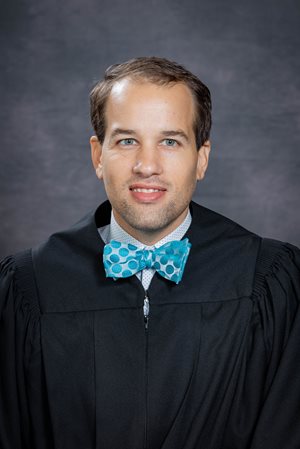 TOPEKA— Chief Judge Jeffrey Gettler of the 14th Judicial District has been appointed to sit with the Kansas Supreme Court to hear oral arguments in two cases on the court's January 28 docket.
TOPEKA— Chief Judge Jeffrey Gettler of the 14th Judicial District has been appointed to sit with the Kansas Supreme Court to hear oral arguments in two cases on the court's January 28 docket.
After hearing oral arguments, Gettler will join Supreme Court justices in their deliberations and decision drafting.
"The Supreme Court looks forward to Chief Judge Gettler hearing cases with us. He will read the case materials, prepare for oral argument, and deliberate with the court on its decisions," said Chief Justice Marla Luckert. "We thank Judge Gettler for helping us, especially because we know he already has a significant caseload in district court to handle."
Gettler was elected a district judge of the 14th Judicial District in 2016 and was named chief judge in January 2019. The 14th Judicial District is composed of Chautauqua and Montgomery counties.
“I thank Chief Justice Luckert for this opportunity to sit with the Supreme Court," Gettler said. "I look forward to what will undoubtedly be an invaluable experience. It is a great honor and I am very humbled.”
Before becoming a judge, Gettler had been in private practice for more than 10 years. He also served as city prosecutor for the city of Independence, city attorney for the city of Cherryvale, and attorney for Unified School Districts 446 and 447.
An Independence native, he graduated from Independence Community College, Loyola University of Chicago, and the University of Kansas School of Law.
All Supreme Court oral arguments are webcast live through the Kansas judicial branch website at www.kscourts.org.
The cases Gettler will hear January 28:
Appeal No. 117,162: State of Kansas v. Christopher M. Dale
Johnson County: (Petition for Review) Dale appeals his convictions for aggravated robbery, charges that arose after he used a BB gun to force three teenage boys to give him three cell phones and an iPod. Dale was convicted of two counts of aggravated robbery and one count of theft. In the Court of Appeals, Dale argued it was a single crime, so he couldn't be convicted of both theft and aggravated robbery and two counts of aggravated robbery. He argued he should be convicted only of a single count of theft. The Court of Appeals reversed the theft conviction and affirmed the aggravated robbery convictions. Issues on review are whether the Court of Appeals erred: 1) when it affirmed the retrial and conviction of Dale for two counts of aggravated robbery after finding his prior conviction for theft, previously affirmed on appeal, was a lesserincluded offense of those aggravated robbery charges; and 2) in finding the two aggravated robbery charges were not multiplicitous.
Appeal No. 117, 456: State of Kansas v. Reginald Frazier
Geary County: (Petition for Review) Frazier appealed his conviction for possession of heroin with the intent to distribute. Prior to sentencing, Frazier moved to withdraw his no contest plea agreement. Frazier argued he presented good cause to withdraw his plea because he entered into the plea agreement based on an understanding it would prevent authorities in Ohio from filing additional charges related to the case. The agreement, however, was meaningless to prevent any future Ohio prosecution. The district court denied Frazier's motion to withdraw his plea and sentenced him to a durational departure as discussed in the plea agreement to a 96- month prison term. The Court of Appeals held the district court did not abuse its discretion when it denied Frazier's presentence motion to withdraw his plea. Issue on review is whether the Court of Appeals erred in finding the district court did not abuse its discretion in rejecting Frazier's motion to withdraw his plea because he presented good cause for a withdrawal of plea pursuant to statute.